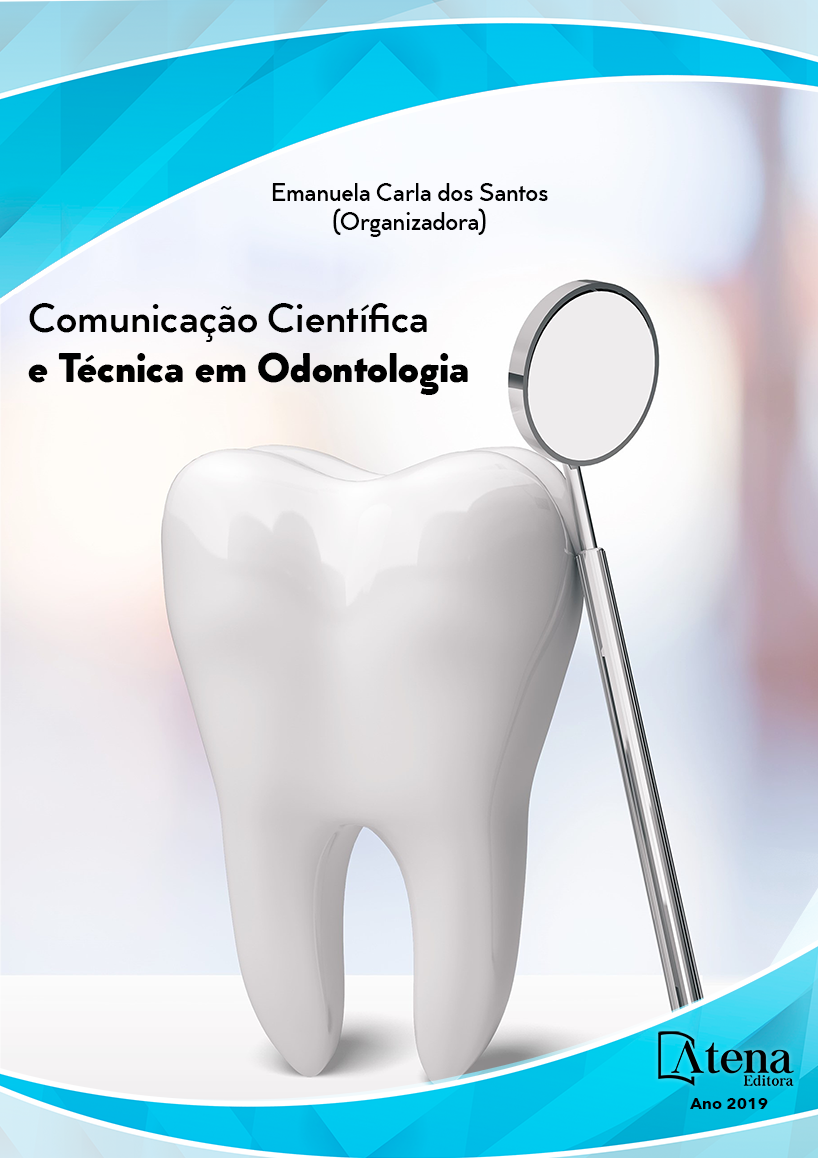
ANÁLISE DA RUGOSIDADE SUPERFICIAL DO ESMALTE DENTAL BOVINO SUBMETIDO A AGENTES CLAREADORES
Este estudo experimental in vitro
analisou a rugosidade superficial do esmalte
dental bovino após a realização de técnicas
de clareamento dental. Um total de quinze
corpos de prova planificados foram divididos
em três grupos: 1- caseiro; 2- consultório;
3- misto. O caseiro foi realizado com gel de
CH6N2O3 15%, pH 6,5% (6h por 14 d) e, o de
consultório, com gel de H2O2 38%, pH 6,5 (2
aplicações/ 15min/ 3 sessões/ intervalo de 5
dias) e o misto foi realizado com intervalo de
5 dias entre os 2 clareamentos. Todos corpos
de prova receberam polimento com disco de
feltro e pasta diamantada, e aplicação tópica de
flúor neutro. As leituras foram realizadas pelo
Perfilômetro Digital 3D e a ponta analisadora
de superfície foi calibrada para uma área de
4 mm x 4 mm. Os dados foram processados
pelo software MountainsMap® Premium
versão 7.0 e representados por imagens
tridimensionais. As comparações foram feitas
pelo teste ANOVA e Bonferroni. Os resultados
obtidos na leitura inicial, após o clareamento
dental e após polimento e aplicação tópica
de flúor foram, respectivamente para cada
grupoi: 1-0,0410±0,0014 μm, 0,1368±0,0265
μm, 0,1361±0,0371 μm; 2-0,0456±0,0052
μm, 0,1752±0,0496 μm, 0,1622±0,0503 μm;
e 3-0,0453±0,0053 μm, 0,1330±0,0260 μm,
0,1328±0,0312 μm. Em todos os grupos
a análise de ANOVA foi significante e a de
Bonferroni significante entre a leitura inicial e o
clareamento dental. Concluiu-se que as técnicas
de clareamento caseiro, em consultório e mista
promoveram aumento da rugosidade superficial
no esmalte bovino planificado e o polimento
e aplicação tópica de flúor não promoveram
redução.
ANÁLISE DA RUGOSIDADE SUPERFICIAL DO ESMALTE DENTAL BOVINO SUBMETIDO A AGENTES CLAREADORES
-
DOI: 10.22533/at.ed.2961901045
-
Palavras-chave: Clareamento Dental. Clareadores. Propriedades de Superfície. Esmalte Dentário.
-
Keywords: Tooth Bleaching. Surface Properties. Bleaching Agentes. Dental Enamel.
-
Abstract:
This in vitro experimental study analyzed the surface roughness of bovine
dental enamel after performing tooth whitening techniques. A total of fifteen planned
specimens were divided into three groups: 1- home bleaching; 2- bleaching in the
office; 3- mixed bleaching. The housekeeping was performed with 15% CH6N2O3 gel,
pH 6.5% (6h for 14 d) and the office with 38% H2O2 gel, pH 6.5 (2 applications / 15min
/ 3 sessions / 5 days) and the mix was performed with a 5 day interval between the 2
whitening. All specimens were polished with felt disc and diamond paste, and topical
application of neutral fluorine. The readings were performed by 3D Digital Profiler and
the surface analyzer tip was calibrated to an area of 4 mm x 4 mm. The data were
processed by the MountainsMap® Premium software version 7.0 and represented
by three-dimensional images. The comparisons were made using the ANOVA and
Bonferroni tests. The results obtained in the initial reading after dental bleaching and
after polishing and topical application of fluoride were, respectively for each group:
1-0.0410 ± 0.0014 μm, 0.1368 ± 0.0265 μm, 0.1361 ± 0.0371 μm; 2-0.0456 ± 0.0052
μm, 0.1752 ± 0.0496 μm, 0.1622 ± 0.0503 μm; and 3-0.0453 ± 0.0053 μm, 0.1330 ±
0.0260 μm, 0.1328 ± 0.0312 μm. In all groups ANOVA analysis was significant and
Bonferroni analysis was significant between initial reading and dental bleaching. It was
concluded that the techniques of home bleaching, in the clinic and mixed promoted
an increase of surface roughness in the planned bovine enamel and the polishing and
topical application of fluoride did not promote reduction.
-
Número de páginas: 15
- ANA MARIA MARTINS GOMES
- ANTÔNIO AUGUSTO GOMES
- ELÂINE CRISTINA VARGAS DADALTO
- LILIAN CITTY SARMENTO
- LUCIANA FARIA SANGLARD
- RENATA DE OLIVEIRA GUARÉ
- Ana Paula Martins Gomes


